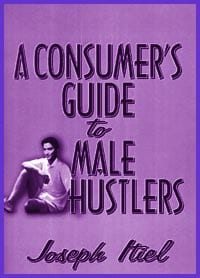This is your assignment. Next time you go to the baths, you are to have sex with the first person who asks, no matter what he looks like. If you’re lucky, this person will be both obese and old. If you’re even luckier, you’ll learn something – about Eros, and possibly yourself.
Author Joseph Itiel did exactly that. A life-long employer of hustlers, he wondered what the hustling experience felt like from the seller’s side. To his surprise (Itiel is normally excited only by younger guys of colour), he found himself pleasurably French-kissing a 74-year-old, and so turned on that he came before his partner did.
This is not to suggest that selling sex is always a thrill. It isn’t. But a force that Itiel calls “lustful energy” can kick in at the most unlikely times. “A hustler,” he writes, “is in the business of supplying lust. This is bothersome to many people because they are afraid to recognize lust as a benevolent energy, unrelated (though in some respects similar) to love.
“This energy can be bought, sold and exchanged…. can even be generated and exchanged by persons who do not like, or even hate, each other.
That clear-eyed attitude informs every page of this smart little book which begins, curiously enough, in Toronto (Itiel was a rather miserable law student here for a few years in the ’50s). He soon waved Canada good-bye, but also soon found himself doing what most gay men find themselves doing much of the time: cruising, mostly unsuccessfully, for sex.
Then, at the age of 26, he “discovered the benefits of hiring hustlers; and how it was possible for me, earning an average salary, to pay for their services.” This book aims to share the secrets.
His essential insight is that sex-workers are professional, independent contractors. That means you can negotiate a fee – as you might, say, with a lawyer or a carpenter. That means that tipping is not necessary (would you, he asks, tip your dentist?). That means you can demand punctuality, respect and a job well done. That means you must reciprocate, treating the professional in your bed with dignity and respect.
Perhaps most importantly of all, you mustn’t fall in love. You mustn’t mistake lust energy for love energy.
Some readers may find Itiel somewhat clinical. I prefer to use the word “unsentimental.” He’s lookin’ for love like the rest of us, but is perfectly happy, till that moment comes, to negotiate a price for the opportunity to have sex with someone he finds attractive at a time and place convenient to him.
“Hustlers and models,” he writes, “are a hedge against the unpredictable results of cruising…. I advocate experiencing the luxury, once a week, a month, a year, of having a predictable, good sexual encounter with a hustler or model of your choice; using the services of hustlers when time is more important than money, or when you want sex without the hassle of cruising.”
He’s also clear-headed enough to recognize that street hustlers in particular rarely live up to the professional standards with which he is so eager to endow them. Bereft of middle-class virtues and skills, they are frequently indifferent to punctuality, feckless, reckless with money, possibly drug-addled.
They may also, however, be excellent sex – tender, affectionate and giving. If things like punctuality are important to you, Itiel recommends the model/masseur – men with apartments and telephones and Daytimers and an understanding of the kinds of behaviour likely to gratify the middle classes.
This is a good book, in the sense that it has many virtuous and practical lessons to teach. Unfortunately, Itiel is an indifferent prose stylist – an earlier book of his dealt with hypnosis, and something of a “you’re feeling sleepy” quality has crept into these pages, too.
Still, his non-judgmental open-heartedness is entirely endearing. And books like this may hasten the day when hustlers, like lawyers, doctors and other professionals, will qualify to endorse passport application.
A Guide To Male Hustlers.
By Joseph Itiel.
Harrington Park Press.
172 pages. $23.99.
Toronto writer Gerald Hannon finds it quite amusing that, by Joseph Itiel’s definition, he qualifies as a “model.”

 Why you can trust Xtra
Why you can trust Xtra


